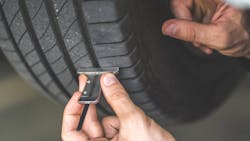Even for quick lube shops that don’t specialize in tires, tire inspections can be a valuable a part of the quick lube process. For many drivers, oil changes are the one and only consistent full-body wellness check for their vehicles.
By adopting standard procedures for tire and fluid checks, quick lube shops can provide added value without taking unnecessary risks, while also building trusting relationships with their guests.
To discuss the ins and outs of tire checks at quick lube shops, NOLN caught up with Ken Frenchak, general manager at Valvoline Express Care in Grove City, Pennsylvania, and Rick Rivera, owner of Classic Lube in DeLand, Florida.
Courtesy Checks vs. Full Tire Services
It is important to first note that even though courtesy checks of tires are encouraged, Frenchak and Rivera agree quick lube shops should be aware of the added layers of liability associated with getting into providing full tire services.
Both Valvoline Express Care and Classic Lube choose not to provide full tire services, citing strong liability issues.
“If your shop does tire rotations, you're now opening yourself up for additional liabilities,” Frenchak says. “For example, if the tires aren't torqued properly on a car—that car drives down the road, the tire falls off, and the vehicle wrecks—who’s the responsible party?”
For Classic Lube, additional factors have gone into the decision to not offer full tire services, adds Rivera.
“Tire replacement requires too much space for inventory and creates problems for the quick lube shop that our technicians are not trained in,” Rivera says. “We are not tire people.”
For quick lube shops looking to get into tire sales and service, the addition of such offerings requires an investment in tire service equipment (including mounting and balancing equipment), as well as TPMS service and tire repair service. Additional training is needed for technicians, as well.
But even for shops that are not looking to make a full leap into the world of tire service and sales, performing simple courtesy tire checks still can be easy opportunity for quick lubes to build trust with their guests, say Rivera and Frenchak.
Tire Checks
As oil change intervals get longer due to improvements in oil and cars, most vehicles will show tire wear and tear every—or every other—oil change service. Because of this, courtesy checks of tire pressure, tread wear, and visual evidence of potential defects are invaluable.
“Our pit tech is trained to look at tires for abnormal wear, such as belts showing on the inner side and uneven wear,” Rivera says. “These traits are easy to spot from under the vehicle.”
To ensure quick lube shops don’t miss anything important when it comes to tires, shop owners should ensure they have a standard operating procedure in place for courtesy checks of tires.
At Classic Lube, that SOP for tire inspections includes the following:
- A flexible tipped digital gauge is used to avoid breaking off valve stemmed sensors.
- Tire pressure is set per the sticker on the door.
- Techs inflate to half-pound measurements on the gauge so 33 lbs. becomes 33.5, for example. This allows the vehicle to show all the tires at the same pressure.
- To limit tire-related liability, the only documented tire-related item put on customer receipts is a recommendation for a tire rotation.
In addition to tire checks, Rivera also encourages his customers to bring their vehicles in between oil changes. He does this by offering a free courtesy check that includes a look at tire pressure and fluid levels, as well as scanning check engine lights.
At Valvoline Express Care, the SOP for courtesy checks is very similar.
“First, we set the tire pressure to the recommended tire pressure that's in the door jamb the manufacturer recommends,” Frenchak says. “While that's being done, the tech is also doing a visual inspection of the tread depth and any visual wear and tear on the front tires. If they see anything, they communicate that verbally to the customer.”
Both shops have regional tire businesses that they will direct their customers to. This is a great way for quick lube shops to create relationships with tire dealers. Not only does it create business for the tire dealers, but it also encourages those businesses to send their customers back for oil changes in return.
Fostering Customer Trust
Customers might not expect tires to be a topic of conversation when they arrive for an oil change at a quick lube that doesn’t offer tire sales and full tire service, but if technicians are able to spot a potential issue, it will demonstrate that the quick lube business is considering more than just oil and filters when it comes to the condition of their guests’ vehicles.
“Anytime you can credibly alert a customer about a possible problem, they will be thankful,” Rivera says. “It is our belief that every time we alert a customer about any possible issues with their vehicle prior to failure, it instills their trust in us. It changes a one-time customer into a long-term one.”
